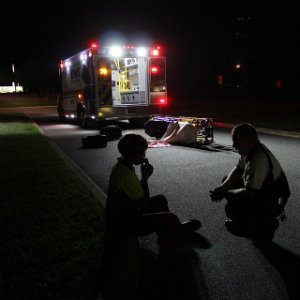In New York City, police officers, firefighters, and sanitation workers who get injured on the job are bound by a different system than private workers. Instead of applying for workers' compensation, these city employees must apply for compensation using the city's disability pension system. EMT's and other city employees, on the other hand, are covered by workers' comp but also have the option to file a claim with the city's pension board if an injury is severe enough to permanently prevent them from returning to work.
As you can imagine, filing a claim with the New York City Employees' Retirement System (NYCERS) can easily turn into a bureaucratic nightmare. It's common for severely injured city employees to have their claims denied. In other situations, workers who desire to return to their previous jobs face struggles receiving approval from their department.
What To Do After A Work Injury? Learn more.

A New York City EMT who got injured on the job has been struggling to receive his disability pension because of headaches with the city's pension board. Hakeem Watkins, 31, injured himself while lifting a stretcher into an ambulance. He ended up with bulging discs and herniation in his lower back. Additionally, Watkins has a history of depression and psychotic symptoms.
In Watkins' first disability pension hearing, he admitted to having suicidal thoughts. The board responded by ordering him to undergo a psychiatric evaluation. Despite their concerns about his mental condition, NYCERS still found him fit to return to work and denied his disability pension application.
An FDNY Bureau of Health Services doctor determined that Watkins' injuries were too severe for him to return to work as an EMT. Watkins was then on sick leave for 18 months before being terminated by the FDNY.
Even though the Workers' Compensation Board determined that Watkins was too severely injured to return to work, he has still struggled to have his disability claim accepted by NYCERS. After his first claim was rejected, Watkins and his lawyer filed an appeal in the Brooklyn Supreme Court. The judge ordered a re-evaluation after it was discovered that in the initial medical evaluation, the board did not examine Watkins' lower back for injuries, and ignored certain aspects of his physical examination, including an MRI of the injured discs.
When a mental health doctor with the NYCERS medical board initially claimed that Watkins' mental health problems were too severe for him to return to work, the board sent him to a different psychologist who claimed that the EMT exaggerated his symptoms. The board then showed this second report to the first doctor, who reversed his decision.
Watkins is still struggling to get the financial compensation he needs. Unfortunately, this type of run-around from the pension board is far too common for injured NYC employees. In this case, NYCERS rejected the first doctor's evaluation in order to find a second one who would give them the answer they wanted to hear.
In another case, a 49-year old sanitation worker named Dennis Palazzola wants his job back, but has been unable to receive approval from the Sanitation Department. Palazzola was placed on medical leave after an off-duty mountain biking accident. The injury required surgery and several months of rehab.
However, in October 2016, Palazzola's private doctor determined that his strength and range of motion had been fully restored. He cleared Palazzola to return to work and filled out the Sanitation Department's medical form. But city doctors still denied his request to be reinstated.
His doctor tried again in November by sending a formal letter to the Sanitation Department, writing that "He is fully capable to work as a full-time sanitation worker with no restrictions." But the Sanitation Department's doctor still refused to send Palazzola back to work.
This process just keeps repeating itself. In December, Palazzola received a letter from the Sanitation Department, notifying him that they had submitted his name to the city for a retirement application. The letter said he had "10 working days to submit written documentation from your private doctor stating you are medically able to sustain the full duties of your title." He met this request, but still has not been approved for reinstatement. Palazzola is 3 years shy of receiving a full pension. If he were to retire today, he would only receive 1/3 of his yearly salary.
As you can tell from these two specific cases, applying for benefits as a city employee can be frustrating. It's common for department leaders to deny workers the coverage they rightfully deserve. Hakeem Watkins has both physical and mental injuries which prevent him from returning to work, but can't get the benefits he needs. In Palazzola's case, the city refuses to let him return to work because 3 more years on the job means a full pension instead of a partial one. This city's hard workers deserve better when an unexpected injury occurs.
If you've recently been injured while working as a city employee and you're feeling overwhelmed by the process, there are options for relief. At Banville Law, our experienced work injury lawyers have helped public sector employees apply for and receive the benefits they need when an injury prevents them from working. We're prepared to guide you through each step of the process, including filing an initial claim or appealing a denied one.

Our injury lawyers are prepared to assist you with all available forms of compensation, which may include industry-specific benefits in addition to:
Seeking financial compensation as an injured municipal worker is complicated. You may struggle to receive the benefits you need or be denied your right to work even after your private doctor has cleared you to return. You may also be eligible for multiple forms of compensation, depending on the circumstances of your employment and your injuries. Attempting to navigate this complex system on your own can be overwhelming, but having legal representation greatly increases your chances of receiving the full compensation you're entitled to.
We understand that a serious work injury causes serious financial anxiety. That's why we offer free consultations and only require payments on a contingency fee basis. You'll only be asked to pay us as a small percentage of your benefits payouts, after we help you secure compensation. This way, you can focus on getting back on your feet without worrying about how you'll pay your bills and support your family.
Do you need help Navigating New York's Workers Comp System? Let our legal team assist you today.